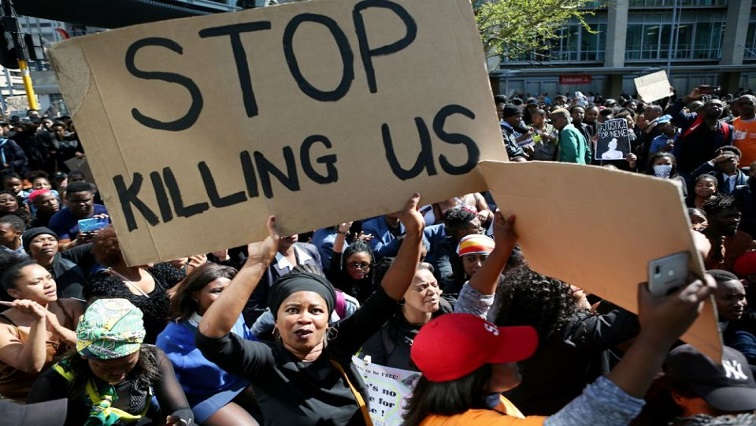Gender-Based Violence (GBV) and femicide continue to be at the forefront during COVID-19 and the national lockdown.
Recently a 31-year-old man was arrested in connection with the murder of Tshegofatso Pule. Pule’s body was found hanging from a tree in Roodepoort, Gauteng, more than a week ago. The 28-year-old, who was eight months pregnant, had been stabbed in the chest.
Pule’s murder is among many tragedies South Africa has seen in recent days. In two other incidents, a 26-year-old mother of two was axed to death and a 39-year-old woman shot and killed.
Analyst and Activist Khaya Sithole says there is a need the people with power to exercise their power immediately against GBV.
“Actually, there is one variable of this particular conversation that you are in full control of, tell us exactly what it is that you have done in order to address this (GBV). How are we in 2020 still hearing people still saying, ‘well, actually I want to report an incident and this is what the policeman or policewoman said? I wasn’t taken seriously. It was not a secure environment. I was in the middle of a room with 20 other people and it was a very vulnerable and emotional time for me.'”
“We can’t have people reporting those incidents in 2020 because this is something that doesn’t require us to sit down and craft an agenda. We need the people that have the power to exercise it immediately.”
Sithole says the society needs to be outraged about every single case of GBV and femicide, emphasising that the people in power need to be pushed to actually make things happen.
This week as South Africa commemorated Youth Day, young people, 44 years later, are still facing many challenges including unemployment as well as GBV and femicide.
President Cyril Ramaphosa asked the young men to take up the struggle against GBV.
A corporate lawyer, and activist Tumi Sole, echoes these sentiments.
“Let’s rather look at what we have now and how we can implement that. As men, we need to take up space. There are immediate things that can be done. What happened to the promises that were made?”
Sole adds that resources should be directed at safe homes so that there is a safe space that is available for victims of GBV.
“Surely, we can through corporate SA and everyone to say these are safe homes this is what will happen. That is where the resources should be directed to, so that the safe space is available. The system is able and it can be done.”
‘Silence around GBV must end’
Ramaphosa says the culture of silence around GBV must end.
Songo Didiza, a Green economist, Founder and CEO of GreenBDG (Green Building Design Group) says we need to think outside the box by looking into the technology.
“Are there ways in which we look towards technology to help enforce our security systems, our court systems? Let’s think outside the box and how do we also collaborate as men and as women and taking up a solution?”
As many cases of femicide have been reported, men were urged to end the abuse and murder of women.
Didiza adds that, as a nation, we need to stop protecting the perpetrators.
“Let’s bring it back to organisations. We cannot as organisations and organisational leaders sit in a position where we are financing femicide in the country; where you have leaders of an organisation also part of the problem being financed. For me, I say take this power away from femicide. Stop protecting the perpetrators.”
The Commission for Gender Equality says it is disgusted at the high rate of Gender-Based Violence that the country is currently facing.
Tholoana Ncheke, a media law expert, says that the psychological makeup of the nation needs to be probed in order to address GBV.
“The more difficult side is understanding the psychological makeup that we have as a nation when it comes to issues of GBV and I think that’s what makes it particularly difficult, not only for South Africa but globally to be able to address it. Because that means that whether you are in power, when you commit such an offense it means exactly that. You cannot hide behind your power.”
President Ramaphosa said up to 51% of South African women have experienced some form of violence at the hands of a loved one.

In the video below is the full Youth Day Panel Discussion:


